Ramzan Fasting Affects Your Health 2025: A Captivating Metabolomics Study
Ramzan fasting, health, metabolism, metabolomics, cancer risk. Ramzan fasting and its effects, understanding the science behind Ramzan fasting, crucial findings, reduced risk of cancer, stimulating autophagic protection against neurodegenerative diseases, considerations, and future research.

Introduction:
Ramzan Fasting Affects Your Health : A Metabolomics Studies Impact on Health and Metabolism
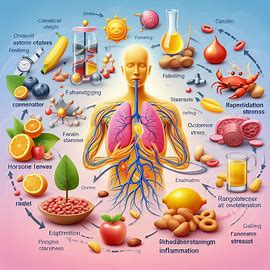
Ramzan Fasting Affects Your Health, A Metabolomics Study reveals how fasting goes beyond fulfilling religious obligations; it can significantly affect one’s overall health and metabolism. This article aims to explore the effects of fasting during Ramadan on the human body, with a particular focus on potential disease prevention such as cancer. Through a comprehensive metabolomics study conducted on 72 Muslim participants, researchers investigated the metabolic changes induced by fasting and their potential health implications.
1 . Ramzan Fasting Understanding the Science Behind:

A recent metabolomics study, conducted on a cohort of 72 practising Muslims during Ramadan, provides valuable insights into the intricate metabolic changes occurring due to fasting. Metabolomics, a cutting-edge technique measuring various molecules in the blood, such as lipids, sugars, amino acids, and hormones, helps gauge the overall metabolic state and uncover fluctuations indicating shifts in health and disease.
2 . Ramzan Fasting Affects Your Health: Its Effects
Utilizing metabolomics, a technique that analyzes hundreds of molecules in the blood, including lipids, sugars, amino acids, and hormones, researchers collected blood samples from participants before and after Ramadan. These samples were then compared to data from the UK Biobank, a project that collects health information from a large British population. Additionally, participants’ blood pressure and body composition were measured.
3 . Ramzan Fasting Affects Your Health: Revelations from the Study:
The results of the study yielded surprising findings. Ramadan fasting exhibited significant alterations in various metabolites within the blood, indicating changes in energy metabolism, inflammation, oxidative stress, and hormone balance. Many of these changes demonstrated promising outcomes, such as lower blood pressure, reduced cholesterol levels, and improved insulin resistance. However, the study also highlighted potentially harmful effects, including elevated uric acid levels, which can trigger conditions like gout and kidney stones.
4 . Crucial Finding: Reduced Risk of Cancer:
Of great significance was the discovery that Ramadan fasting led to a considerable reduction in the risk of three types of cancer: lung, colorectal, and breast. Risk scores for these cancers, based on specific metabolites known to be associated with them, were significantly lower after Ramadan fasting compared to before. Moreover, these scores were even lower than the average scores observed within the UK Biobank population. This suggests that fasting may possess protective effects against cancer, potentially through modulating hormone levels, inflammation, and oxidative stress. However, additional studies are required to validate these findings and comprehend the underlying mechanisms further.
5 . Effects of Fasting on Blood Sugar and Insulin Levels:
Fasting can affect blood sugar and insulin levels differently, depending on the type and duration of fasting. Generally, fasting tends to lower blood sugar and insulin levels, although fluctuations or spikes can occur.
6 . Understanding Blood Sugar and Insulin:
Blood sugar refers to the glucose present in the bloodstream, which serves as the primary source of energy for the body’s cells and organs. Insulin, on the other hand, is a hormone responsible for facilitating the movement of glucose from the blood into the cells. After a meal, blood sugar levels increase, leading to the release of insulin from the pancreas to maintain balance. During fasting, blood sugar levels decrease, resulting in reduced.
7 . Stimulating Autophagy:
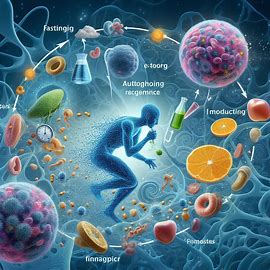
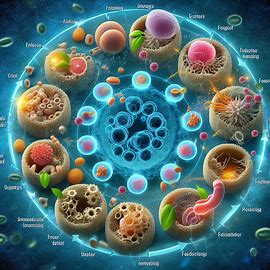
Fasting may enhance cell repair and longevity by triggering autophagy, the process of removing or recycling damaged cells and molecules1.
8 . Protection against Neurodegenerative Diseases:
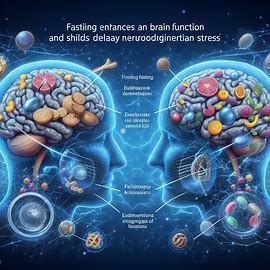
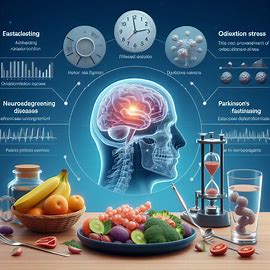
By enhancing brain function and shielding against oxidative stress, fasting has the potential to prevent or delay the onset of neurodegenerative diseases like Alzheimer’s and Parkinson ‘s12.
- Ketones have been shown to have neuroprotective effects, such as increasing the production of brain-derived neurotrophic factor (BDNF), a protein that promotes the growth and survival of neurons and synapses. BDNF also enhances learning, memory, and cognitive function. 12
- Fasting can also reduce oxidative stress, which is a condition where the production of reactive oxygen species (ROS) exceeds the capacity of the antioxidant system. ROS can damage cellular components, such as DNA, proteins, and lipids, and contribute to ageing and neurodegeneration. Fasting can lower the levels of ROS by reducing inflammation, improving mitochondrial function, and activating antioxidant enzymes. 123
- Neurodegenerative diseases, such as Alzheimer’s and Parkinson’s, are characterized by the progressive loss of neurons and synapses in specific brain regions, leading to cognitive and motor impairments. Oxidative stress and inflammation are implicated in the pathogenesis of these diseases, as they can trigger neuronal death and dysfunction, as well as the accumulation of toxic protein aggregates, such as amyloid-beta and alpha-synuclein. 45
- By enhancing brain function and shielding against oxidative stress, fasting has the potential to prevent or delay the onset of neurodegenerative diseases. Fasting may also enhance the clearance of protein aggregates and stimulate the regeneration of new neurons and synapses. 236

9 . Lowering Cancer Risk:
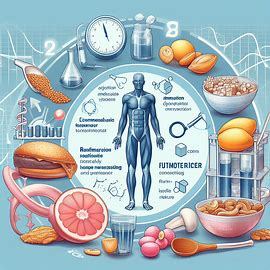
Fasting may mitigate the risk of certain cancers, including breast, colorectal, and lung cancer, by regulating hormone levels, inflammation, and oxidative stress13.
10 . Ramzan Fasting Affects Your Health: Implications and Significance of the Study:
Published in The American Journal of Clinical Nutrition, this study pioneers the use of metabolomics to explore the impact of Ramadan fasting on health and metabolism. The insights gained from this research shed light on the potential advantages and risks of fasting, offering valuable information to millions of Muslims and health-conscious individuals who observe this practice.
11 . Reducing Inflammation and Oxidative Stress:
Ramzan Fasting Affects Your Health, inflammation serves as the body’s natural response to injury or infection. However, prolonged inflammation can lead to conditions such as diabetes, heart disease, and cancer. Oxidative stress, on the other hand, results from an imbalance between free radicals production and the body’s ability to counteract them. These unstable molecules can damage cells, contribute to aging, and trigger diseases.
Here is an image that illustrates how fasting can reduce inflammation and oxidative stress by modulating hormones, enhancing antioxidants, and stimulating autophagy:
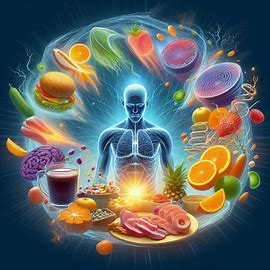

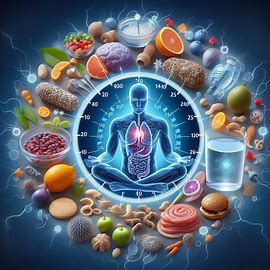
Fasting can effectively assist in reducing inflammation and oxidative stress by:
- Modulating the levels of hormones and cytokines that regulate inflammation, such as insulin, leptin, adiponectin, and interleukin-6. Fasting can lower insulin and leptin resistance, which are associated with chronic inflammation and metabolic disorders. Fasting can also increase adiponectin, which has anti-inflammatory and insulin-sensitizing effects. Fasting can also reduce interleukin-6, which is a pro-inflammatory cytokine. 1234
- Enhancing the production of antioxidants and the activity of antioxidant enzymes, such as glutathione, catalase, and superoxide dismutase. These molecules and enzymes can neutralize free radicals and prevent oxidative damage to cells and tissues. Fasting can also induce the expression of genes that encode antioxidant enzymes, such as Nrf2 and Sirt1. 2345
- Stimulating the process of autophagy, which is the cellular self-cleaning mechanism that removes damaged or dysfunctional components, such as proteins, organelles, and DNA. Autophagy can reduce inflammation and oxidative stress by clearing away harmful substances and recycling them into new molecules. Autophagy can also protect against infection, cancer, and neurodegeneration. 2346
![Intermittent fasting reduces inflammation and oxidative stress by modulating hormones, enhancing antioxidants, and stimulating autophagy]
12 . Different Fasting Methods:
Before embarking on fasting, consult a medical professional to determine the most suitable approach based on individual goals and lifestyle. Some popular fasting methods include:
- Alternate-Day Fasting:
This method involves alternating between regular eating and fasting or extremely low-calorie intake (less than 500 calories) on specific days3.
With this approach, individuals eat normally for five days a week and fast or consume limited calories (less than 500 calories) on the remaining two days3.
- Daily Time-Restricted Fasting:
This technique involves restricting eating to a specific window of time each day, such as 6, 8, or 10 hours.
13 . Ramzan Fasting Affects Your Health: Considerations and Future Research:
The impact of fasting on inflammation and oxidative stress depends on factors such as the type, duration, and frequency of fasting, as well as an individual’s health status, age, and lifestyle. Further research is necessary to establish the optimal fasting regimen and evaluate the long-term benefits and risks across different populations.
Conclusion:
Ramadan fasting holds the potential to deliver significant health benefits and positively impact metabolism. Beyond its religious significance, this practice has been linked to favourable metabolic changes, including reduced risk of cancer and improvements in blood pressure, cholesterol levels, and insulin resistance. However, more extensive research is essential to fully comprehend the underlying mechanisms and establish the true extent of these effects. Overall, this study serves as a foundation for further exploration and encourages individuals to consider the potential long-term health gains associated with fasting during Ramadan.
However, it is crucial to approach fasting with caution, seeking medical guidance to ensure compatibility with individual health and goals. Continued research will provide a deeper understanding of the metabolic effects of fasting and its potential to promote overall well-being.
- Disclaimer: The contents of this article are intended to raise awareness about common health issues and should not be viewed as sound medical advice for your specific condition. You should always consult with a licensed medical practitioner before following any suggestions outlined in this article or adopting any treatment protocol based on the article’s contents.
- Discover Miswak 2024: Nature’s Great Toothbrush Revolution

